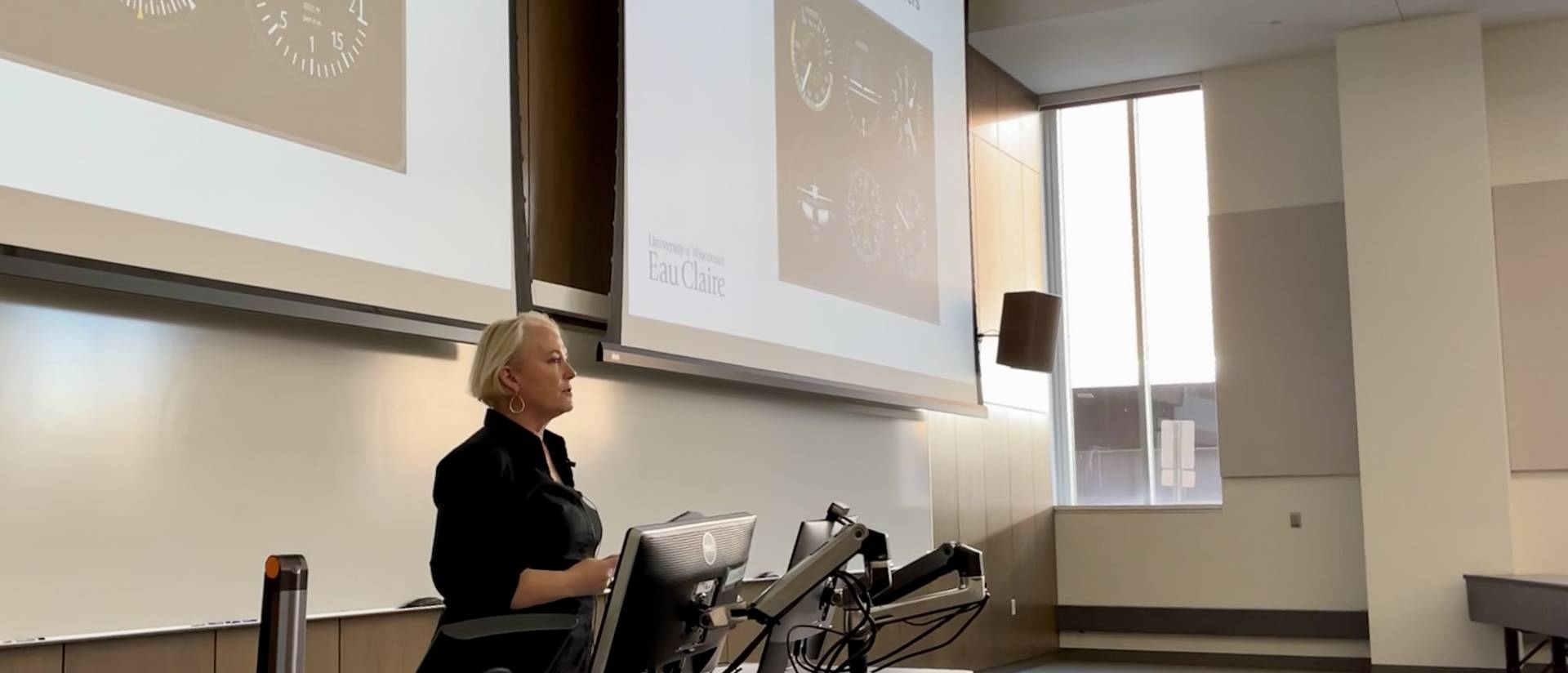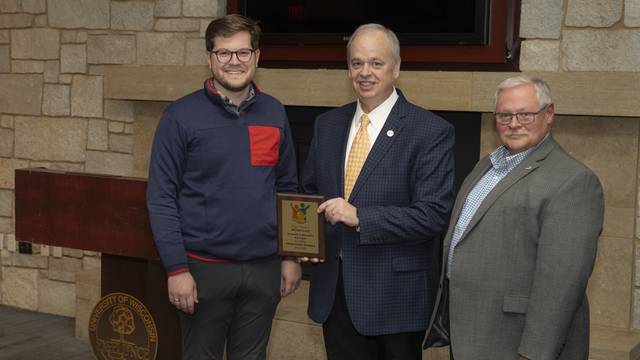Photo caption: Grace Crickette, vice chancellor for finance and administration, presented at the October 12 Budget Forum.
Grace Crickette, vice chancellor for finance and administration, held a Budget Forum on Wednesday focused on UW-Eau Claire's current fiscal challenges, enrollment trends, the financial planning process, investments in growth initiatives and spend analytics.
Chancellor James Schmidt kicked off the forum by summarizing the challenges currently facing higher education.
"If you look at the spendable dollars that we get from the State of Wisconsin, it's smaller today then it was the day I got here, and I don't need to remind everybody that our tuition has been frozen," Schmidt said. "If you pay any attention to higher education newspapers like the Chronicle of Higher Education or Inside Higher, we know that higher ed is challenged - we have a number of challenges. The Midwest and the Northeast are seeing smaller groups of high school graduates each year, so there's fewer of those prepared 18-year-olds. We know that...of those who graduate, they're more diverse and you have more first-generation college students, and therefore there can be barriers for them to come to college."
Following Chancellor Schmidt, Crickette explained how UW-Eau Claire is reacting to the national trends and challenges, stating, "Our Strategic Plan calls for returning our enrollment to our 2010 level of 10,200 full-time equivalent students through expanded recruitment and increased retention. Even in these challenging times we are determined to achieve this goal without compromising our distinctive reputation."
Crickette continued, "As we emerge from the pandemic, we are facing a much different financial picture. We have fewer students today on campus than we have had for more than a decade. For Fiscal Year ‘23, we are looking at a $5.8 million gap between current enrollment and our operational budget."
Despite the challenges, Crickette is confidant in the university's leadership capacity to face them.
"I can attest to Chancellor Schmidt’s ability to understand, communicate, plan, and make difficult financial decisions. When I proposed a process I had used successfully at another state institution to encourage deliberative decision making, he embraced it immediately," she stated.
As a member of the financial planning team, Dr. Brewer Doran, dean of the college of business, spoke to the need for increased enrollment and student retention along with how an increase in either area is an increase in revenue. Doran explained in detail three investments that focused on data-supported solutions to increase first year retention.
“UWEC’s first year retention rates are generally good, but we can do better – and we strive to," stated Doran. "But from a budget perspective, retaining students we have already recruited is just good financial practice and yields a higher overall return than recruiting additional students to replace the ones we have lost. Not to mention the ethical, pedagogical, and workforce reasons to make sure students thrive,” Doran stated.
Crickette explained the iterative nature of the financial planning process and the use of scenarios based on financial levers to develop forecasting reports. The current General Program Revenue Funds scenarios forecasts that the University will likely operate in a structural deficit in Fiscal Years '23 and '24. The University's response will be to leverage reserve funds in Fiscal Years '23 and '24, combined with new revenue from growth investments and savings from new efficiencies in spending. The anticipated result will be no further reserve funds used starting in Fiscal Year '25 and the elimination of the structural deficit.
The university plans to identify spending efficiencies in a deliberate manner.
"We are also being strategic in identifying areas to reduce expenses rather than taking across the board cuts. We are leveraging spend analytics and forming workgroups to focus on specific areas of spend to develop strategies for improvement," Crickette said.
Crickette ended her presentation with a commitment to budget transparency and efficiency.
“Our goal each year is to cover ongoing annual expenditures with ongoing revenues. We are committed to ensuring administrative and financial efficiency across all University departments and operations. The information presented today reflects our commitment and goal to ensure transparency surrounding how the University responsibly and effectively allocates financial resources to meet our academic and operating obligations,” Crickette stated.
This was the first in a series of Budget Forums scheduled for the 2022-23 academic year.
A full recording of the Budget Forum is available here.



